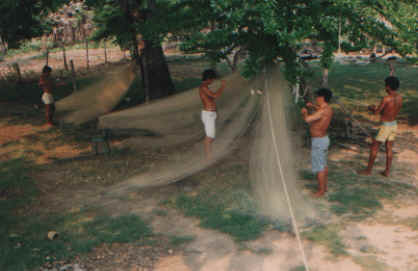A Floodplain Community (continued)
 I have chosen these photographs because they express different aspects of communal relations. The bottom one was taken after a large party in a neighbouring community. The boat is very full and low down. Some people are still recovering on top of the boat.
I have chosen these photographs because they express different aspects of communal relations. The bottom one was taken after a large party in a neighbouring community. The boat is very full and low down. Some people are still recovering on top of the boat.
Day to day life in the community is peaceful and industrious. Children can be found playing in front of the houses or in the water, young girls and older people can be seen sitting on the veranda chatting, young men may sit under a tree drinking or mending something, and a host of others may be walking around from one place to the next. There is hardly any shouting or crying and people appear to be relaxed. Pigs, chickens, dogs and cattle roam freely, forever picking at the grass or scratching the ground. Around the houses there may be some flowers and plants, in raised containers, which are normally old canoes with too many holes to be repairable. Great stress is placed on keeping the area around the houses clean (limpo), which means clearing the land of long grass and making sure the place looks attractive. This creates good morale in the community, since a sure sign of internal conflict is not caring about the places in which people live, like houses looking clean and beautiful (bonita). Beautiful flowers and clean spaces are said to be coisas para se fazer feliz, things to make you happy. 
Such spaces are intimate and informal places, characterised by the constant movement of people and objects. The concept of people helping one another, ajudando cada um is the phrase used, is pertinent in this regard. The principle of ajudar extends further than simply help or helping out. This would imply a casualness that belies the importance. It means a co-operation and harmony of people who are sharing their daily lives. Between kin, `work' is conceptualised as help, whereas between stranger and non-kin work is evaluated in terms of the product and its value. Also, central to the idea of ajudar is the informality of relations based on mutuality, where no tabs are kept on who does what and when.


 I have chosen these photographs because they express different aspects of communal relations. The bottom one was taken after a large party in a neighbouring community. The boat is very full and low down. Some people are still recovering on top of the boat.
I have chosen these photographs because they express different aspects of communal relations. The bottom one was taken after a large party in a neighbouring community. The boat is very full and low down. Some people are still recovering on top of the boat.